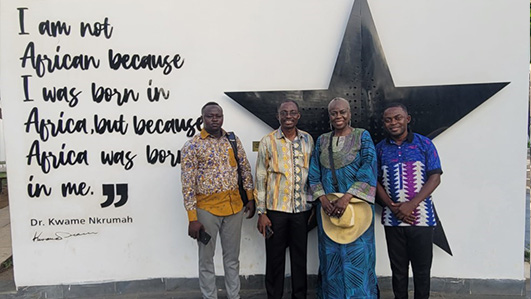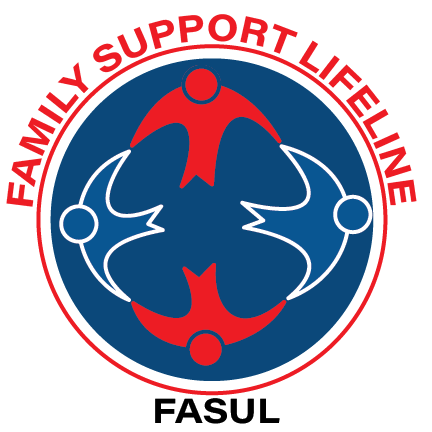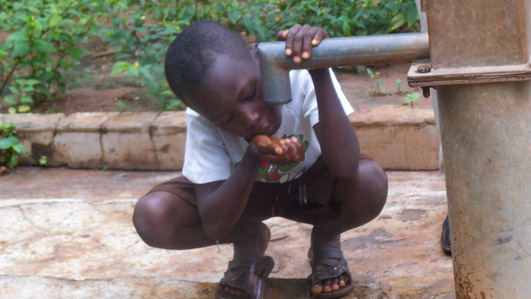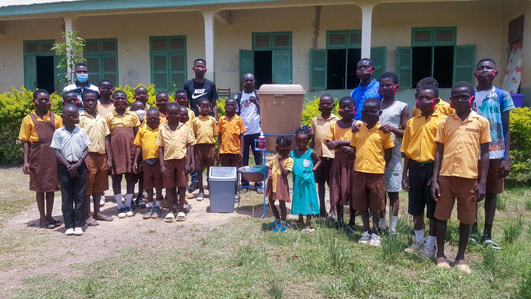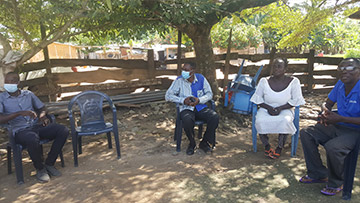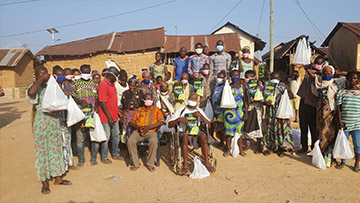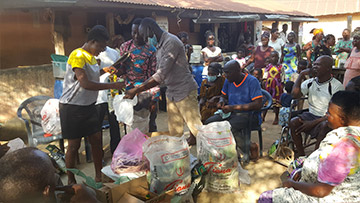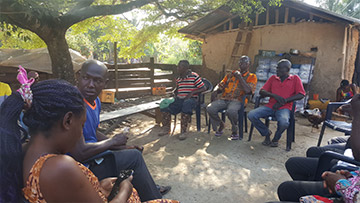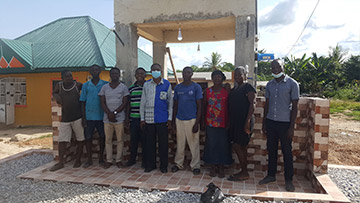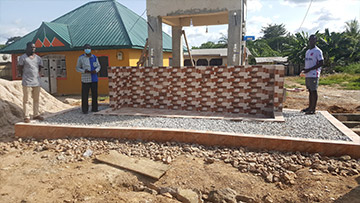Prof. Olufunmilayo (Funmi) Olopade, the Director of the Center for Clinical Cancer Genetics and Global Health (CGH) of the University of Chicago (UC) visited with Family Support Lifeline (FASUL), Ghana on the 6th May 2024.
This was in furtherance of the idea to help deepen FASUL’s development interventions that are supported by the Kiphart Foundation, CGH and other Chicago Partners. It was also aimed to help FASUL renew its interest in the provision of essential development support interventions in underserved communities of Ghana.
The visit was necessitated by the quest to explore viable opportunities to deepen FASUL’s impacts in Kiphart-Beneficiary Communities (KBCs) in Ghana. Led by the Director of FASUL, Dr. Alexander K. Eduful and Rev. Thompson Eduful (a member of the FASUL Board of Advisors), FASUL welcomed Prof. Funmi to Ghana. At a meeting held at the Kempinski Gold Coast City Hotel, the Director of FASUL presented some significant accomplishments of FASUL in the areas of water provision, education and human capacity development interventions since 2005.
In particular, three major questions guided the discussion/presentation:
1. What was the situation in the communities before the Kipharts’ and other families of Chicago and the Kenilworth Union Church of Chicago’s interventions in Ghana?
2. What progress/impacts have been made?
3. What needs to be done to accelerate development in those communities?
It was revealed that before the Chicago Partners’ interventions through FASUL, many communities depended on poor quality, and sometimes, contaminated, water sources. These resulted in waterborne diseases for a significant number of rural people in the beneficiary communities where FASUL operates. Indeed, anecdotal reports indicated that a number of the people in most of the communities who depended on some of the contaminated water suffered from severe itching, disfiguring skin conditions, and visual impairment, likely caused by the parasitic worm onchocerca volvulus. Also, some of the people, particularly women and children, used to walk long distances to access water and some of these sources even dry up during the dry season. Travelling such long distances hampered the performance of school children as they got to school mostly late and tired.
Further, the discussions laid out FASUL’s key accomplishments, including transformative impacts on the beneficiary communities. In particular, the Director indicated that the earlier interventions in water provision (2000-2012) were provision of non-mechanized hand-dug wells.
However, beginning from 2014, mechanized wells were provided. In all, of the over 76 boreholes constructed by FASUL, 2013-2019 alone saw construction of 19 machine dug wells, 4 of which have been mechanized. To continually provide safe drinking water and sustain the provision of water, FASUL intends to explore opportunity to mechanize all these wells. Dr. Eduful highlighted that, in all, about 1500 households across over 70 rural communities and over 10,000 children have benefited from the water and sanitation initiatives of FASUL since 2004. These communities are spread across five local government areas, with a total population of over 300,000.
Also, in the advancement of education, seven (7) low-resource schools have been built, six (6) of the schools are in Ashanti Region and one in Central Region. Before establishment of the schools, children in the beneficiary communities traveled a distance to nearby towns for basic education, and, as a result, many brilliant young children were not enrolled in school. However, with the support of the Chicago Partners, several children are able to attend school right in their own neighborhoods. Additionally, as part of the provision of educational infrastructure, three fully-furnished functional computer labs have been built in the Kipharts schools. This is to aid teaching and learning and equip young students with computer skills.
Moreover, recognizing the worth of digital skills in today’s world, 10 computers were donated to the Center for Gender and Advocacy at the Takoradi Technical University (TTU) in 2024. This came on the back of an August 2022 request made to FASUL during Prof. Robert Jeffery Chaskin’s (the Director of the Susan and Richard Kiphart Center for Global Health and Social Development [KCGHSD] at the Crown Family School of Social Work, Policy, and Practice of the University of Chicago) visit to Ghana, to curb the escalating rate of teenage pregnancies and female school drop-out in the Takoradi Metropolis.
Within the vision of FASUL’s newly introduced rural empowerment initiatives (REI), focusing on, among others, human capacity development, FASUL established the Kiphart-Eduful Scholarship (KES) in 2021 to support brilliant but economically-disadvantaged students. The first beneficiary is Nicholas Annan from Mansokwaa Kiphart Community School, who had a dream of pursuing higher education but was nearly denied due to inability of his parents to afford tertiary education. With FASUL’s help and support of the international partners, we’re proud to say that Nicholas is now in the third year majoring in Economics at Kwame Nkrumah University of Science and Technology (KNUST). Three other students who shared the same story have received scholarship and we plan to enroll two more students every year.
Speaking of human development, the FASUL human capacity development initiative continues to make significant impacts. Through the initiative, 150 women and youth gained valuable entrepreneurship skills, enhancing their employment prospectus and generating multiple income sources. As part of this intervention, supported by its dedicated Chicago partners, FASUL identified 15 trainees with outstanding zeal to apply their newfound skills in establishing tangible businesses. Each of these individuals received a grant of GHS 1,500 in 2024 to support their entrepreneurial endeavors.
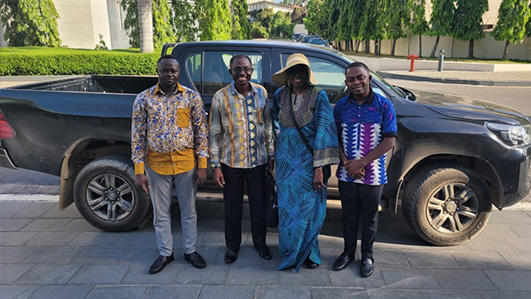
Also, FASUL has established partnerships with local academic and other institutions to help deepen the interventions across rural and underserved communities across Ghana. Some of these include KNUST and TTU while others include local governments (i.e. district/municipal assemblies). It is our vision that such partnerships can help scale up our interventions across the length and breadth of the country.
With heartfelt gratitude, acknowledging that these accomplishments would not have been possible without the immense support of the international partners: the Kipharts, CGH, the Kanters, the John Becker Welch and other Chicago families as well as the Kenilworth Union Chuirch who provided the funding for the Old Krapa Kenilworth Basic School in the Ejisu Municipality. Their supports have been instrumental in enabling such enormous positive impacts. The achievement chalked notwithstanding, FASUL expresses the need for additional resources to further improve and expand the interventions, and thereby reaching out to and benefitting more lives. In specific terms, the Director highlighted such projects as mechanizing the 15 machine dug wells, resuscitating the computer lab at the Krapa Kenilworth School, providing furniture to the Krapa Kenilworth School, increasing the scholarship and entrepreneurship skills interventions, among others.
Prof. Funmi commended the achievement of FASUL and, following the presentation keenly, provided significant insights to improve upon the interventions. She also provided insights intended to enhance the relationship between the communities, individuals, FASUL, and the Chicago partners. She shared that there is a need to tell the stories in more compelling manner and on broader platforms including social media and other internet platforms to increase visibility of FASUL and reach to potential partners. She made it clear that in addition to what the organization has done, it should also highlight on what it intends to achieve in the future, and also mobilize key resources locally and provide linkages, ensuring sustainability to help deepen the interventions.
